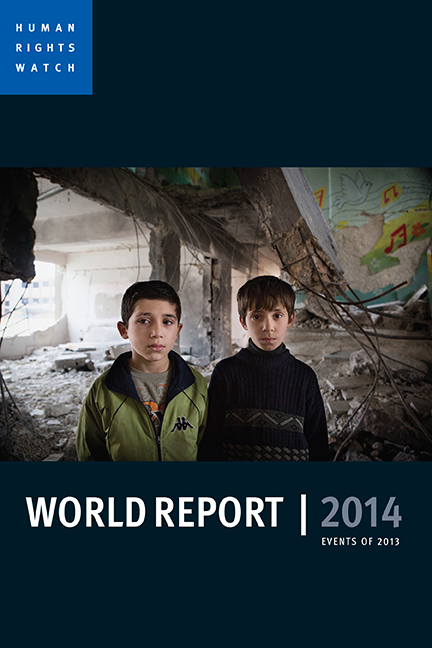Book contents
- Frontmatter
- Dedication
- HUMAN RIGHTS WATCH
- Table of Contents
- Foreword
- Rights Struggles of 2013: Stopping Mass Atrocities, Majority Bullying, and Abusive Counterterrorism
- The Human Rights Case for Drug Reform How Drug Criminalization Destroys Lives, Feeds Abuses, and Subverts the Rule of Law
- Putting Development to Rights: Integrating Rights into a Post-2015 Agenda
- The Right Whose Time Has Come (Again) Privacy in the Age of Surveillance
- Photo Essays
- AFRICA
- AMERICAS
- ASIA
- EUROPE AND CENTRAL ASIA
- MIDDLE EAST AND NORTH AFRICA
- UNITED STATES AND CANADA
- 2013 HUMAN RIGHTS WATCH PUBLICATIONS
- Acknowledgments
The Right Whose Time Has Come (Again) Privacy in the Age of Surveillance
Published online by Cambridge University Press: 07 May 2022
- Frontmatter
- Dedication
- HUMAN RIGHTS WATCH
- Table of Contents
- Foreword
- Rights Struggles of 2013: Stopping Mass Atrocities, Majority Bullying, and Abusive Counterterrorism
- The Human Rights Case for Drug Reform How Drug Criminalization Destroys Lives, Feeds Abuses, and Subverts the Rule of Law
- Putting Development to Rights: Integrating Rights into a Post-2015 Agenda
- The Right Whose Time Has Come (Again) Privacy in the Age of Surveillance
- Photo Essays
- AFRICA
- AMERICAS
- ASIA
- EUROPE AND CENTRAL ASIA
- MIDDLE EAST AND NORTH AFRICA
- UNITED STATES AND CANADA
- 2013 HUMAN RIGHTS WATCH PUBLICATIONS
- Acknowledgments
Summary
Technology has invaded the sacred precincts of private life, and unwarranted exposure has imperiled our security, dignity, and most basic values. The law must rise to the occasion and protect our rights.
Does this sound familiar?
So argued Samuel Warren and Louis Brandeis in their 1890 Harvard Law Review article announcing “The Right to Privacy.” We are again at such a juncture. The technological developments they saw as menacing—photography and the rise of the mass circulation press—appear rather quaint to us now. But the harms to emotional, psychological, and even physical security from unwanted exposure seem just as vivid in our digital age.
Our renewed sense of vulnerability comes as almost all aspects of daily social life migrate online. At the same time, corporations and governments have acquired frightening abilities to amass and search these endless digital records, giving them the power to “know” us in extraordinary detail.
In a world where we share our lives on social media and trade immense amounts of personal information for the ease and convenience of online living, some have questioned whether privacy is a relevant concept. It is not just relevant, but crucial.
Indeed, privacy is a gateway right that affects our ability to exercise almost every other right, not least our freedom to speak and associate with those we choose, make political choices, practice our religious beliefs, seek medical help, access education, figure out whom we love, and create our family life. It is nothing less than the shelter in which we work out what we think and who we are; a fulcrum of our autonomy as individuals.
The importance of privacy, a right we often take for granted, was thrown into sharp relief in 2013 by the steady stream of revelations from United States government files released by former National Security Agency (NSA) contractor Edward Snowden, and published in the Guardian and other major newspapers around the world. These revelations, supported by highly classified documents, showed the US, the UK, and other governments engaged in global indiscriminate data interception, largely unchecked by any meaningful legal constraint or oversight, without regard for the rights of millions of people who were not suspected of wrongdoing.
- Type
- Chapter
- Information
- World Report 2014Events of 2013, pp. 41 - 52Publisher: Bristol University PressPrint publication year: 2014

